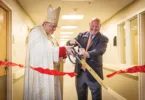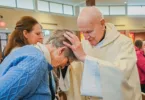
by Moira Cullings
moira.cullings@theleaven.org
KANSAS CITY, Kan. — It was a normal Tuesday morning for Mike Connelly, then-principal of the former Immaculata High School in Leavenworth.
School was just starting when someone told him to turn on the TV, that a plane had just crashed into one of the Twin Towers of the World Trade Center in New York.
“At first, I thought it was an accident,” said Connelly. “I thought it was a terrible, terrible tragedy, but I didn’t think that it was a terrorist attack at that instant.”
Connelly went inside his office and turned on his own TV.
“Shortly after that, the second plane crashed into the other tower,” he said.
“At that time,” he continued, “we knew that it was a terrorist attack on the Americans.”
It’s been 20 years since the September 11, 2001, terrorist attacks.
But teachers and principals across the Archdiocese of Kansas City in Kansas can easily call to mind the fear, sorrow and uncertainty surrounding that day.
Jarring silence
It was Cathy Fithian’s first year as principal of Christ the King School in Kansas City, Kansas, in the fall of 2001.
As a native New Yorker, Fithian was stunned by the events of Sept. 11, especially since she knew some of the first responders personally.
“Fortunately, none of them passed away in the tragedy,” she said, “but it was nerve-wracking nonetheless.”

Fithian was faced with the difficult decision of what to tell her students. Ultimately, she decided to inform only the middle-schoolers of what was happening.
“Throughout the day, we monitored the news reports,” she said, “but foremost, we prayed. We said prayers in our classrooms throughout the school for peace in our world.”
One moment of the day is particularly ingrained in her mind.
“A vivid memory of mine was standing out on the playground and coming to the realization that the skies were eerily quiet,” she said.
“It seemed that the entire neighborhood, community [and] world was quiet,” she added.
Fithian also recalled the days after the attacks, when “it seemed that people were in shock in the day-to-day routines of going from place to place, including the grocery store, where kindness was the rule rather than the exception.”
That day also impacted life for school communities, she said.
“Students grew up faster than they should,” said Fithian. “Teachers were even more attentive to the anxiety of their students, and parents hugged their kids a little harder that night.
“9/11 reminded us, too, that in any event — awesome or tragic — God is present in our lives, and we need turn to him with our needs.”
School security
Mike Sullivan was in the main office at St. Thomas Aquinas High School in Overland Park with teacher Leo Brown, who turned on the TV to news of the attacks.
“Our first thought was, ‘Is this a national attack on everybody?’” said Sullivan.
Sullivan has been at Aquinas for 33 years as principal of student services. His first concern on Sept. 11 was securing the building and ensuring his students were safe.
He worried about his own family, too. His son was a senior at Aquinas and in government class at the time.
“He said their room was very [somber],” said Sullivan.
Sullivan said that back then, Aquinas was part of a program that gave every classroom a television set, and that watching the morning news was a normal routine throughout the school.
What they saw that day, though, was not — and it had a deep impact on Sullivan’s life.
“I’m a patriotic person,” he said. “I guess I never thought the United States would be vulnerable like that.”

Sullivan said that Sept. 11 and the 1999 Columbine High School shooting were two key events that shaped school safety moving forward.
“They changed a lot of protocol and [the concept of] running a building, security and safety,” he said.
The day also left its mark on Sullivan’s career as a principal.
“It’s a memory you’ll never forget,” he said, “but it’s one you want to forget.
“It’s a moment in our history that changed our society in general and school safety.”
Constant prayers
Angela Herman had taught theology and worked as the campus minister at Hayden High School in Topeka for a couple of years when 2001 rolled around.
Her day began with a planning period, and she was working in her office when the theology department chair at the time discovered a plane had struck the World Trade Center after talking on the phone with his wife.
“I asked him if it was an accident, and he said he didn’t know,” said Herman. “Instinctively, we both took off running toward my classroom to turn on the television.”

Like Aquinas, Hayden had a television in every classroom.
“The rest of the day was spent with theology classes all crammed together in one classroom, watching coverage and going to the chapel to pray a rosary every hour,” said Herman.
“We didn’t have great cable,” she added, “so we built an antenna using some paper clips to improve the clarity. We were glued to the news.”
Herman remembers leading a rosary that day and forgetting the words to the Hail Mary.
“How many Hail Marys have I said in a lifetime,” she said, “and I forget the words? It was just that kind of a day.”
It was also a day that changed Herman’s view of her role as a teacher. She was used to having answers for her students, but that day, she didn’t.
“The only answer I had was, ‘I don’t know, but let’s pray about it,’” she said.
It also shifted the dynamic in the classroom in the days and weeks that followed.
“In those days, we were not teachers and students,” said Herman. “We were simply Americans and Catholics with our hearts broken, linked together by our humanity and our sorrow.”
Herman was gratified by what she witnessed during that time.
“After 9/11, we saw an explosion of patriotism and service,” she said. “Love of neighbor was no longer something we just talked about, and our churches were filled with people praying for our country.
“It was a beautiful thing to see.”
Close to home
Connelly is now the director of student financial support and family assistance for Xavier School in Leavenworth.
Being near Fort Leavenworth on Sept. 11 and having students of military families in his charge made the attacks personal and caused an additional layer of fear.
“We did make sure that our building was locked down and secure for our students,” said Connelly. “That was one of the first things that we did.”
Once Connelly heard a plane crashed into the Pentagon and another crashed in Pennsylvania, the situation became more and more concerning, especially for those at Fort Leavenworth, who were in a state of lockdown.
“Being a military fort, you weren’t sure what was next at that time,” he said. “You didn’t know the magnitude of the attack.”

Within a day of the attacks, the Immaculata community discovered that Ron and Pat Sloan, alumni of the high school, lost their son Paul in the towers.
“To find out their son perished, to feel the pain they must’ve been going through, was unbelievable,” said Connelly. “You could only imagine what happened.”
Xavier honors Paul during an annual Sept. 11 remembrance ceremony at the school.
Connelly said that even though the students now weren’t alive to experience Sept. 11, there are many lessons it can teach them.
“Everything was put aside [back then],” he said. “We were all for our country and defending our country.
“If anything, I felt it united us as a nation.”






